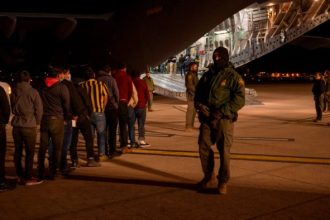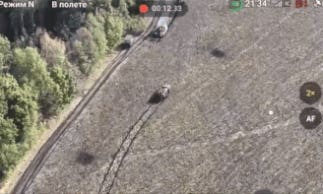On Oct. 15, Russian marines from the 810th Naval Infantry Brigade counterattacked the eastern edge of the 270-mile salient that Ukrainian troops carved out of western Russia’s Kursk Oblast starting in early August.
Barreling headlong into the Ukrainian army—the 61st Mechanized Brigade and 17th Tank Brigade, apparently—the Russian marines met a wall of steel and explosives. One Russian BTR-82 wheeled APC rolled right up to a Ukrainian T-64 tank. The tank opened fire with its 125-millimeter cannon from tens of feet away, striking the BTR.
It was the “closest tank engagement I’ve ever seen!” wrote Mark Hertling, a retired U.S. Army general. Dazed and wounded Russians stumbled out of the damaged and smoking BTR, right before a second Ukrainian tank put another 125-millimeter round into the vehicle.
Two days later, Ukrainian troops discovered one of the BTR’s passengers lying nearby, half-dead. “Honestly, I was so relieved,” the 19-year-old Russian soldier said from his hospital bed, presumably somewhere in Ukraine.
The Russian recalled the skirmish that nearly killed him. “We were on a BTR, then boom,” he said. “I couldn’t see anything. I thought I lost my leg. It was cut off later. Somehow I escaped the BTR.”
That the BTR’s crew failed to notice the Ukrainian tanks—or recognize them as Ukrainian, at least—wasn’t just bad luck on the part of the crew. It’s part of a trend across the 700-mile front line of Russia’s 32-month wider war on Ukraine. In mid-October, Ukrainian tanks scored point-blank hits on attacking Russian vehicles on both sides of the Kursk salient, outside Kurakhove in eastern Ukraine and in Zaporizhzhia Oblast in southern Ukraine.
It’s apparent what’s happening. Seemingly sensing Ukraine’s deepening manpower shortage and anticipating the coming winter, Russian forces attacked all along the front line in early October. The objective: to take as much Ukrainian territory—or retake Ukrainian-occupied Russian territory—before worsening weather makes cross-country assaults more difficult for the attackers.
The Russians are in a hurry, and impatiently hurling masses of minimally trained troops into hasty and disorganized attacks.
How minimally trained? Consider that one 28-year-old Russian soldier claimed he joined the army on July 11, arrived at the front line in eastern Ukraine a couple of weeks later and was sent on his assault—in the ruins of Toretsk—on August 13. He was wounded six days later.
Rushed planning and disinterested leadership expose Russian soldiers to extreme risk. When a Russian APC rolls right up to a Ukrainian tank, it’s not necessarily the crew’s fault—even when the crew is poorly trained. Maybe they’d been told they’d meet up with friendly forces, and mistook the Ukrainian vehicles for those allies. Maybe their commanders had assured them that any nearby Ukrainian tanks had been knocked out by pre-attack bombardment.
In any event, Russian losses have spiked as the October attacks have escalated. The Russians lost nearly 1,700 troops killed and wounded along with more than 100 vehicles in 24 hours ending on Monday, according to the Ukrainian general staff in Kyiv. If that’s not a record for Russian losses in the current war, it’s close.
The Kremlin has made good some of its losses by increasing bonus payments to new enlistees. But it’s also counting on thousands of North Korean troops to reinforce battered front-line units. The first of those North Koreans trucked into Kursk over the weekend and apparently joined the survivors of the ill-fated 810th Naval Infantry Brigade.
But as dire as Russia’s manpower problems are, Ukraine’s are worse. After holding out in the eastern fortress town of Vuhledar for two years without significant reinforcement, the Ukrainian army’s 72nd Mechanized Brigade was down to a fraction of its original strength. One 350-person battalion reportedly had just 30 active troops when the brigade finally retreated from Vuhledar on Oct. 1.
It’s a race to the bottom of their respective populations for both sides of the wider war in Ukraine. For the individual soldiers, it can be a nightmarish and dehumanizing experience. “We were sent as meat,” said the 19-year-old survivor of the BTR debacle in Kursk.
Read the full article here





